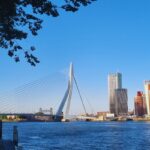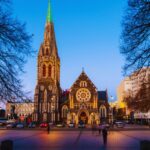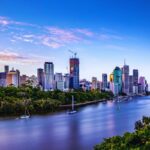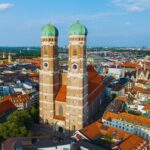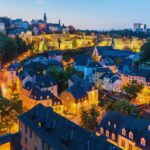Rotterdam stands as one of the most dynamic and economically significant cities in the Netherlands, offering exceptional opportunities for professionals seeking high paying jobs in Rotterdam and across Europe. As the largest port city in Europe and a central hub for international trade, Rotterdam plays a vital role in global logistics, finance, and technology. Its strategic location, modern infrastructure, and innovation-driven economy make it a prime destination for both local and international professionals aiming to secure high salary jobs in the Netherlands.
The city’s economy is powered by key industries such as logistics, maritime trade, information technology, engineering, finance, and renewable energy, all of which are experiencing steady growth. Rotterdam’s focus on sustainability, digital transformation, and smart infrastructure has positioned it among Europe’s leading centers for innovation and economic development.
For skilled workers and expatriates, Rotterdam offers not only competitive compensation but also a high standard of living, a multicultural environment, and a strong emphasis on work-life balance. The Netherlands’ favorable employment policies, including the 30% tax ruling for highly skilled migrants, further enhance its appeal to global talent.
This article provides an in-depth analysis of the current job market, key industries, salary expectations, and actionable strategies for professionals seeking high income employment in Rotterdam. Whether you are an experienced specialist or an international job seeker exploring career opportunities in the Netherlands, Rotterdam presents a thriving environment for career growth, stability, and long-term success.
Overview of Rotterdam’s Economy and Employment Landscape
Rotterdam has established itself as one of Europe’s most advanced and globally connected economic centers. The city’s economy is built on a foundation of trade, logistics, technology, and innovation, making it an ideal destination for professionals pursuing high paying jobs in Rotterdam. As the economic heart of South Holland and a key part of the Randstad metropolitan region, Rotterdam contributes significantly to the overall GDP of the Netherlands and continues to attract multinational companies and skilled professionals from around the world.
Economic Structure and Global Significance
Rotterdam’s economy is anchored by the Port of Rotterdam, the largest seaport in Europe and one of the busiest in the world. The port handles hundreds of millions of tonnes of cargo annually, serving as a gateway between Europe, Asia, and the Americas. This global connectivity supports thousands of high salary jobs in logistics, supply chain management, and maritime operations. The city’s port-related industries generate substantial revenue and have driven continuous investment in infrastructure, automation, and green logistics.
Beyond logistics, Rotterdam has diversified its economy into technology, finance, renewable energy, and advanced manufacturing. The city’s commitment to digital transformation and sustainability has positioned it as a leader in the European innovation ecosystem. As a result, professionals with expertise in data analytics, cybersecurity, engineering, and renewable energy management are in high demand.
Key Sectors Driving Employment
Rotterdam’s employment landscape is shaped by several high-performing industries that collectively sustain its economic growth.
The maritime and logistics sector remains the city’s backbone, employing tens of thousands of professionals in areas such as port management, freight forwarding, customs operations, and marine engineering. The integration of automation and artificial intelligence in port operations has also created new high income employment in Rotterdam for specialists in robotics, data systems, and process optimization.
The technology and IT sector has expanded rapidly, supported by the city’s digital infrastructure and innovation hubs. Rotterdam’s growing tech ecosystem includes companies specializing in software development, cloud computing, and artificial intelligence, offering competitive salaries and career advancement opportunities.
The financial and professional services sector is another key contributor to Rotterdam’s economy. The city hosts major banking, insurance, and investment firms that provide high paying finance jobs in the Netherlands, including roles in risk management, compliance, corporate accounting, and fintech innovation.
The engineering and construction industry continues to thrive due to ongoing infrastructure development and urban expansion. Projects related to sustainable housing, green architecture, and smart city design have increased demand for civil engineers, project managers, and environmental consultants.
Additionally, the renewable energy and sustainability sector is rapidly growing as Rotterdam transitions toward a low-carbon economy. Investments in offshore wind energy, hydrogen technology, and circular economy initiatives are generating new high salary jobs in renewable energy and environmental engineering.
Economic Growth and Investment Climate
Rotterdam’s economic growth is supported by a robust investment climate and forward-looking government policies. The city attracts substantial foreign direct investment from global corporations seeking access to European markets. Its modern infrastructure, efficient transportation networks, and business-friendly environment make it a preferred location for regional headquarters and international operations.
The local government’s focus on innovation and sustainability has led to the creation of specialized zones for technology startups, research institutions, and clean energy companies. These initiatives are fostering collaboration between academia, industry, and government, driving the creation of high paying jobs in Rotterdam across multiple disciplines.
Integration with the Randstad Region
Rotterdam’s inclusion in the Randstad—an interconnected metropolitan region that includes Amsterdam, The Hague, and Utrecht—enhances its economic competitiveness. This integration enables professionals to access a broader labor market while benefiting from the city’s lower cost of living compared to Amsterdam. The region’s shared infrastructure and collaborative business ecosystem make it easier for companies and workers to operate across cities, further strengthening employment opportunities.
Employment Outlook and Workforce Demand
The demand for skilled professionals in Rotterdam continues to rise, particularly in sectors that support digitalization, sustainability, and global trade. The city’s workforce is highly diverse, with both local and international talent contributing to its economic success. Employers increasingly seek individuals with technical expertise, cross-cultural communication skills, and experience in sustainable business practices.
As Rotterdam continues to expand its role as a global logistics hub and innovation center, the availability of high income employment in the Netherlands is expected to grow steadily. The combination of economic stability, strategic location, and forward-thinking industries ensures that Rotterdam remains one of the most promising destinations for professionals aiming to build successful, well-compensated careers in Europe.
Key Industries Offering High Paying Jobs in Rotterdam, Netherlands
Rotterdam’s economy is supported by a diverse range of industries that provide strong employment opportunities and competitive salaries. The city’s strategic location, modern infrastructure, and emphasis on sustainability and innovation have positioned it as one of Europe’s most important economic centers. Professionals seeking high paying jobs in Rotterdam can find lucrative roles across multiple sectors, each contributing significantly to the Netherlands’ overall economic growth.
Maritime and Logistics Industry
The maritime and logistics sector is the cornerstone of Rotterdam’s economy and one of the largest employers in the region. The Port of Rotterdam, Europe’s busiest seaport, handles vast volumes of international cargo and supports a global network of shipping, warehousing, and distribution companies. This sector offers numerous high salary jobs in logistics and supply chain management, including positions such as port operations managers, marine engineers, freight coordinators, and customs specialists.
Automation and digital transformation have reshaped the logistics landscape. The integration of artificial intelligence, robotics, and data analytics in port operations has created new roles for IT professionals, systems analysts, and process optimization experts. As Rotterdam continues to modernize its port infrastructure, demand for professionals skilled in logistics technology, maritime engineering, and supply chain analytics remains strong.
Technology and IT Sector
Rotterdam has emerged as a growing technology hub, attracting startups and multinational corporations focused on digital innovation. The city’s strong digital infrastructure and commitment to smart city development have driven demand for professionals in software development, cybersecurity, data science, and cloud computing.
Companies in Rotterdam are investing heavily in automation, artificial intelligence, and blockchain technology to enhance business efficiency and security. This has led to the creation of numerous high paying IT jobs in the Netherlands, particularly for specialists in programming, network engineering, and digital transformation.
The city’s technology ecosystem is also supported by research institutions and innovation centers that collaborate with private companies to develop cutting-edge solutions. Professionals with expertise in machine learning, data analytics, and information systems management are among the most sought after in the local job market.
Finance and Banking Sector
Rotterdam’s financial sector plays a vital role in supporting both domestic and international business operations. The city is home to banks, insurance firms, investment companies, and fintech startups offering a wide range of high paying finance jobs in Rotterdam.
Key roles include financial analysts, risk managers, compliance officers, investment advisors, and corporate accountants. With the Netherlands’ strong regulatory framework and international trade connections, professionals in finance can expect competitive compensation and opportunities for career progression.
The rise of financial technology has also created demand for professionals skilled in fintech innovation, data-driven finance, and digital payment systems. As financial institutions continue to integrate advanced technologies, roles that combine finance and IT expertise are becoming increasingly valuable.
Engineering and Construction Industry
The engineering and construction sector in Rotterdam is thriving due to continuous urban development, infrastructure modernization, and sustainability initiatives. The city’s focus on smart architecture, green building design, and flood-resilient infrastructure has created a surge in high salary jobs in engineering and project management.
Civil engineers, structural designers, project planners, and environmental consultants are in high demand, particularly for large-scale construction and infrastructure projects. The city’s ongoing transition toward sustainable urban environments also requires professionals skilled in renewable materials, energy-efficient systems, and environmental engineering.
Rotterdam’s engineering firms are recognized for their expertise in water management and sustainable design, making them global leaders in climate-resilient construction. This specialization attracts international projects and enhances the city’s reputation as a center for innovative engineering solutions.
Renewable Energy and Sustainability
Rotterdam is at the forefront of the Netherlands’ transition to a green economy. The city’s commitment to reducing carbon emissions and adopting clean energy solutions has created significant opportunities for high paying jobs in renewable energy and environmental science.
Key areas of growth include offshore wind energy, hydrogen production, waste-to-energy conversion, and circular economy initiatives. Companies in this sector seek engineers, energy consultants, sustainability managers, and environmental policy experts to support large-scale renewable projects.
The Port of Rotterdam is also being developed into a hub for sustainable energy logistics, enabling the import, storage, and distribution of hydrogen and biofuels. Professionals specializing in energy systems engineering, sustainability consulting, and environmental management can expect strong career prospects and competitive compensation.
Healthcare and Life Sciences
The healthcare and life sciences sector in Rotterdam continues to expand, driven by the city’s growing population, advanced medical research facilities, and innovation in biotechnology. Hospitals, research institutions, and pharmaceutical companies offer a wide range of high income employment in Rotterdam for healthcare professionals, researchers, and medical technologists.
Roles in medical research, clinical data analysis, and healthcare management are particularly well-compensated. The development of digital health technologies, telemedicine, and personalized medicine has also increased demand for professionals with expertise in healthcare informatics and biomedical engineering.
Rotterdam’s healthcare ecosystem benefits from strong collaboration between universities, hospitals, and private research organizations, ensuring continuous innovation and career growth opportunities for skilled professionals.
Manufacturing and Industrial Technology
Rotterdam’s industrial sector remains a vital contributor to its economy, with a focus on advanced manufacturing, chemical production, and process engineering. The adoption of Industry 4.0 technologies—such as automation, robotics, and the Internet of Things—has transformed traditional manufacturing into a high-tech industry offering high paying jobs in industrial engineering and production management.
Professionals skilled in process optimization, quality control, and industrial automation are in high demand. The city’s chemical and petrochemical industries, located near the port, also offer strong employment opportunities for mechanical engineers, chemical engineers, and operations managers.
As sustainability becomes a core business priority, companies are increasingly seeking professionals who can integrate environmentally responsible practices into industrial operations. This shift is creating new roles in green manufacturing and sustainable production systems, further expanding Rotterdam’s industrial job market.
Creative and Cultural Industries
Rotterdam’s creative economy is growing rapidly, fueled by its reputation as a modern, diverse, and innovative city. The creative sector includes architecture, design, media production, and marketing, all of which contribute to the city’s global identity.
Professionals in digital marketing, graphic design, architecture, and media production can find high salary jobs in Rotterdam within agencies, startups, and international firms. The city’s vibrant cultural scene supports a steady demand for creative professionals who blend artistic talent with digital innovation.
Rotterdam’s economic diversity ensures that professionals across multiple disciplines can find rewarding and well-compensated opportunities. The city’s emphasis on sustainability, technology, and global connectivity continues to attract investment and talent, creating a steady supply of high paying jobs in Rotterdam. Whether in logistics, technology, finance, or renewable energy, the city offers a stable and forward-looking job market for skilled individuals seeking to build successful careers in the Netherlands.
In-Demand Professions and Skill Shortages in Rotterdam, Netherlands
Rotterdam’s thriving economy continues to attract professionals from across the world, yet several sectors face persistent skill shortages that create strong opportunities for qualified candidates. The city’s rapid technological transformation, sustainability initiatives, and expanding logistics network have increased the demand for specialized expertise. For job seekers aiming to secure high paying jobs in Rotterdam, understanding which professions are most in demand and aligning their skills accordingly is essential.
Information Technology and Digital Innovation
The technology sector in Rotterdam is expanding rapidly, with companies investing heavily in digital transformation, automation, and cybersecurity. As a result, there is a significant shortage of professionals with advanced technical skills. High paying IT jobs in the Netherlands are concentrated in areas such as software engineering, data science, artificial intelligence, and cloud computing.
Employers are also seeking specialists in cybersecurity, network architecture, and systems integration due to the growing need for secure digital infrastructure. Data analysts and business intelligence professionals are in high demand as organizations rely on data-driven strategies to improve efficiency and decision-making. Candidates with certifications in AWS, Azure, or Google Cloud, along with experience in programming languages such as Python, Java, and C++, are particularly competitive in Rotterdam’s job market.
Engineering and Technical Professions
Engineering remains one of the most critical and well-compensated fields in Rotterdam. The city’s infrastructure development, renewable energy projects, and maritime operations rely heavily on engineers with expertise in civil, mechanical, electrical, and environmental disciplines. High salary jobs in Rotterdam are widely available for project engineers, structural designers, and process engineers, particularly in construction, port logistics, and industrial manufacturing.
There is also growing demand for professionals in renewable energy engineering, driven by the Netherlands’ commitment to sustainability and carbon reduction. Engineers specializing in offshore wind, hydrogen technology, and sustainable infrastructure are especially sought after. Employers value candidates with practical experience, technical certifications, and knowledge of sustainable design principles.
Logistics and Supply Chain Management
Given Rotterdam’s position as Europe’s largest port, logistics and supply chain management are among the most vital sectors in the city’s economy. However, there is a shortage of skilled professionals who can manage complex international trade operations. High paying jobs in logistics include supply chain analysts, freight managers, port operations supervisors, and customs compliance specialists.
The integration of digital logistics systems has also created demand for professionals skilled in automation, blockchain-based supply chain solutions, and predictive analytics. Employers are increasingly looking for candidates who can combine logistics expertise with technological proficiency to optimize global distribution networks.
Finance, Accounting, and Risk Management
The financial services sector in Rotterdam continues to grow, with multinational corporations and investment firms establishing regional offices in the city. There is a consistent need for finance professionals with expertise in corporate accounting, risk management, and financial analysis. High paying finance jobs in Rotterdam are available for auditors, investment analysts, compliance officers, and financial controllers.
The rise of fintech has also introduced new opportunities for professionals skilled in financial technology, data security, and digital payment systems. Employers are particularly interested in candidates with international experience, strong analytical abilities, and familiarity with Dutch and EU financial regulations.
Renewable Energy and Environmental Sustainability
Rotterdam’s transition toward a sustainable economy has created a strong demand for professionals in renewable energy and environmental management. The city’s investment in offshore wind energy, hydrogen production, and circular economy projects has led to the creation of numerous high salary jobs in renewable energy and environmental engineering.
Professionals with backgrounds in energy systems design, environmental science, and sustainability consulting are highly valued. There is also a growing need for specialists in waste management, carbon reduction strategies, and green building design. Rotterdam’s focus on clean energy innovation ensures long-term career opportunities for individuals committed to environmental sustainability.
Healthcare and Life Sciences
The healthcare and life sciences sector in Rotterdam is expanding due to population growth, medical research advancements, and increased investment in biotechnology. Hospitals, pharmaceutical companies, and research centers are seeking qualified professionals for roles in healthcare management, biomedical engineering, and clinical research.
High paying jobs in healthcare include medical specialists, biotechnologists, laboratory analysts, and healthcare data managers. The integration of digital health technologies has also created new roles for professionals in telemedicine, health informatics, and medical software development. Candidates with advanced degrees in medicine, biology, or healthcare management are particularly competitive in this sector.
Construction and Infrastructure Development
Rotterdam’s continuous urban expansion and infrastructure modernization have generated strong demand for skilled workers in construction and project management. The city’s focus on sustainability and flood resilience has led to the development of large-scale projects requiring expertise in civil engineering, architecture, and environmental design.
High income employment in Rotterdam is available for project managers, quantity surveyors, and construction engineers who can deliver sustainable and efficient infrastructure solutions. The adoption of digital construction methods, such as Building Information Modeling (BIM), has also increased the need for professionals with technical and digital design skills.
Education and Research
The education and research sectors in Rotterdam are playing a crucial role in supporting the city’s knowledge-based economy. Universities and technical institutions are seeking qualified educators, researchers, and academic administrators. High paying jobs in education are available for professors, curriculum developers, and research scientists, particularly in fields such as business, engineering, and life sciences.
Professionals with international teaching experience and advanced academic qualifications are in high demand. The city’s strong focus on innovation and collaboration between academia and industry ensures a continuous need for skilled researchers contributing to scientific and technological progress.
Emerging Professions and Future Skill Demand
Rotterdam’s evolving economy continues to generate new career paths in emerging industries. The rise of artificial intelligence, digital logistics, and green technology is reshaping the job landscape. Future high salary jobs in Rotterdam are expected to center around automation, robotics, data ethics, and sustainable energy systems.
Employers are increasingly prioritizing candidates with hybrid skill sets—those who combine technical expertise with leadership, communication, and problem-solving capabilities. Professionals who invest in continuous learning and adapt to technological advancements will remain competitive in Rotterdam’s job market.
Government and Private Sector Initiatives
To address skill shortages, both the Dutch government and private organizations are investing in vocational training, digital education, and international recruitment programs. Initiatives such as lifelong learning programs and public-private partnerships are designed to align workforce skills with industry needs.
These efforts ensure that Rotterdam remains a global hub for innovation and employment, offering a wide range of high paying jobs in the Netherlands for both local and international professionals. By focusing on skill development and specialization, job seekers can position themselves for long-term success in one of Europe’s most competitive and forward-looking labor markets.
Salary Expectations and Cost of Living in Rotterdam, Netherlands
Rotterdam offers competitive compensation packages across various industries, making it one of the best destinations in Europe for professionals seeking high paying jobs in the Netherlands. Salaries in Rotterdam are influenced by factors such as education, experience, industry specialization, and the level of technical expertise. However, understanding the balance between income potential and cost of living is essential for professionals planning to work and settle in the city.
Average Salary Levels in Rotterdam
The average gross salary in Rotterdam ranges between €45,000 and €65,000 per year, depending on the profession and level of experience. Entry-level professionals typically earn between €30,000 and €40,000 annually, while mid-level employees can expect between €50,000 and €70,000. Senior professionals, project managers, and executives in specialized industries can earn upwards of €90,000 per year or more.
High salary jobs in Rotterdam are most common in sectors such as information technology, engineering, finance, logistics, and renewable energy. For instance, software engineers and IT consultants generally earn between €60,000 and €85,000 annually, while senior data scientists can exceed €100,000. In the finance and banking sector, investment managers and risk analysts often earn between €70,000 and €120,000 per year.
Engineers working in renewable energy, construction, or industrial design typically earn between €55,000 and €90,000 annually, depending on project scope and specialization. Healthcare professionals, particularly medical specialists and research scientists, can earn salaries ranging from €80,000 to €150,000 per year, reflecting the high demand for skilled talent in these sectors.
Factors Influencing Salaries
Several key factors determine salary levels in Rotterdam. Industry demand, educational background, and professional certifications play a significant role in influencing compensation. Employers in high-growth sectors such as technology, logistics, and renewable energy are willing to offer premium salaries to attract and retain skilled professionals.
Experience is another major determinant of salary growth. Professionals with international experience or specialized technical skills often command higher pay. Additionally, proficiency in both English and Dutch can enhance employability and salary potential, particularly for managerial or client-facing roles.
Company size and location also affect earnings. Multinational corporations and firms operating within the Port of Rotterdam or central business districts typically offer higher salaries than smaller firms. However, these roles often come with greater responsibilities and performance expectations.
The 30% Ruling for Highly Skilled Migrants
One of the most attractive financial incentives for foreign professionals working in the Netherlands is the 30% tax ruling. This policy allows eligible highly skilled migrants to receive up to 30% of their gross salary tax-free for a period of up to five years. The ruling is designed to attract international talent and offset relocation costs.
For professionals seeking high paying jobs in Rotterdam, the 30% ruling can significantly increase net income and improve financial stability. Eligibility depends on specific criteria, including income thresholds, employment contracts, and residency status. Many international employees use this benefit to maximize their disposable income while working in the Netherlands.
Cost of Living in Rotterdam
While Rotterdam offers attractive salaries, understanding the cost of living is crucial for evaluating overall financial comfort. Compared to Amsterdam, Rotterdam’s cost of living is relatively moderate, making it more affordable for professionals and families.
Housing expenses are generally the largest component of monthly costs. Renting a one-bedroom apartment in the city center typically costs between €1,200 and €1,800 per month, while similar accommodation outside the city center ranges from €900 to €1,300. For families, three-bedroom apartments can range from €1,800 to €2,500 depending on location and amenities.
Utilities, including electricity, heating, water, and internet, average between €200 and €300 per month. Public transportation is efficient and affordable, with monthly passes costing around €100. Many professionals also choose cycling as a primary mode of transport, which reduces commuting expenses.
Groceries and dining costs are moderate compared to other major European cities. A single person’s monthly grocery expenses typically range from €300 to €450, while dining out at mid-range restaurants can cost between €20 and €40 per meal. Healthcare expenses are well-regulated under the Dutch healthcare system, with mandatory health insurance averaging €120 to €150 per month.
Comparison with Other Dutch Cities
When compared to Amsterdam or Utrecht, Rotterdam offers a better balance between income and living costs. Although salaries in Amsterdam may be slightly higher, rent and daily expenses are significantly more expensive. Professionals working in Rotterdam often enjoy a higher quality of life due to lower housing costs, shorter commutes, and access to modern amenities.
This cost advantage makes Rotterdam an appealing destination for professionals seeking high income employment in the Netherlands without the financial strain of living in the capital. The city’s affordability also allows for greater savings potential, particularly for individuals benefiting from the 30% tax ruling.
Disposable Income and Quality of Life
After accounting for taxes and living expenses, professionals in Rotterdam generally retain a comfortable disposable income. The Netherlands’ progressive tax system ensures fair contributions while offering social benefits such as healthcare, education, and public infrastructure.
Rotterdam’s residents enjoy a high standard of living supported by excellent public services, safety, and cultural amenities. The city’s emphasis on sustainability, accessibility, and quality urban planning enhances overall well-being. Professionals earning high salaries in Rotterdam can maintain a financially stable lifestyle while enjoying leisure, travel, and family-oriented living.
Salary Growth and Career Advancement
Rotterdam’s job market provides strong opportunities for salary growth and career progression. Professionals who invest in skill development, gain local experience, and demonstrate leadership potential can expect steady increases in compensation.
Employers in Rotterdam value continuous learning and often provide training programs, performance-based bonuses, and professional development allowances. Employees working in high-demand sectors, such as IT, engineering, and finance, can expect annual salary growth between 5% and 10%, depending on performance and market conditions.
In addition to monetary compensation, many companies offer benefits such as flexible working hours, remote work options, pension contributions, and travel allowances. These non-salary benefits enhance overall job satisfaction and contribute to long-term career stability.
Financial Outlook for Professionals in Rotterdam
Rotterdam’s combination of competitive salaries, moderate living costs, and strong economic stability makes it one of the most attractive cities in Europe for professionals seeking high salary jobs in the Netherlands. The city’s balanced economic environment allows employees to achieve financial security while enjoying a high quality of life.
With continued investment in innovation, renewable energy, and digital transformation, Rotterdam’s job market is expected to maintain upward salary trends. For skilled professionals and expatriates, the city offers not only financial rewards but also long-term career growth in one of Europe’s most forward-looking economies.
The Rotterdam Job Market for International Professionals
Rotterdam has become one of the most attractive destinations in Europe for international professionals seeking high paying jobs in the Netherlands. Its globally connected economy, diverse workforce, and progressive employment policies make it an ideal environment for skilled migrants and expatriates. The city’s openness to international talent, combined with its strong economic base, provides numerous opportunities across multiple industries including logistics, technology, finance, and renewable energy.
Employment Opportunities for Foreign Workers
Rotterdam’s job market is highly internationalized, with many multinational corporations and global organizations headquartered or operating within the city. Companies in logistics, maritime operations, information technology, and finance frequently recruit foreign professionals to fill specialized roles that require advanced technical or managerial expertise.
English is widely used in professional settings, particularly within international firms, making it easier for expatriates to integrate into the workforce. However, knowledge of Dutch remains an advantage, especially for positions that require client interaction, public service, or collaboration with local authorities. Many employers value bilingual candidates who can navigate both Dutch and international business environments.
High paying jobs in Rotterdam for foreigners are available in sectors such as software development, engineering, data analytics, project management, and supply chain operations. Professionals with experience in renewable energy, sustainability consulting, and financial management are also in high demand due to the city’s focus on green innovation and sustainable growth.
Work Visa and Residence Permit Options
The Netherlands offers several visa and residence permit options designed to attract international talent. The most common route for skilled professionals is the Highly Skilled Migrant Visa, which allows qualified individuals to live and work in the country under the sponsorship of a recognized employer. This visa is particularly beneficial for those pursuing high salary jobs in Rotterdam, as it grants legal employment rights and access to Dutch social services.
Other visa options include the EU Blue Card, which is available to non-EU citizens with a university degree and a job offer meeting specific salary thresholds, and the Intra-Corporate Transfer (ICT) permit for employees relocating within multinational organizations. Graduates from Dutch universities can also apply for the Orientation Year Visa, which allows them to stay in the Netherlands for up to one year to search for employment.
The Dutch immigration system is known for its efficiency, and most visa applications are processed within a few weeks. Employers in Rotterdam often assist foreign hires with visa sponsorship, relocation support, and integration programs to ensure a smooth transition.
The 30% Tax Ruling Advantage
One of the key incentives for international professionals working in the Netherlands is the 30% tax ruling. This policy allows eligible foreign employees to receive up to 30% of their gross salary tax-free for a period of five years. The benefit is designed to attract highly skilled workers and offset the costs associated with relocation.
For professionals seeking high income employment in Rotterdam, the 30% ruling significantly increases net earnings and enhances financial stability. It is particularly advantageous for expatriates in high-demand sectors such as engineering, IT, and finance. Eligibility depends on factors such as job type, income level, and distance from the Netherlands prior to employment.
International Companies and Business Environment
Rotterdam’s economy is home to a large number of international companies, including global leaders in logistics, energy, and technology. The presence of multinational corporations such as Unilever, Shell, and Maersk has created a strong demand for skilled professionals with global experience.
The city’s strategic location and world-class port infrastructure make it a central hub for trade and commerce in Europe. Many foreign professionals are employed in roles related to international business development, supply chain management, and corporate strategy. The city’s business environment is characterized by efficiency, transparency, and innovation, offering excellent career prospects for those pursuing high paying jobs in Rotterdam.
Rotterdam’s startup ecosystem is also expanding, driven by innovation in fintech, clean technology, and digital logistics. International entrepreneurs and professionals with experience in product development, marketing, and business analytics are increasingly sought after by emerging companies.
Language and Cultural Adaptation
While English proficiency is high in Rotterdam, learning Dutch can improve career prospects and social integration. Many employers appreciate employees who make an effort to understand local culture and language, as it demonstrates commitment and adaptability. Dutch language skills can also open doors to public sector roles and leadership positions that require interaction with local stakeholders.
Cultural adaptation in Rotterdam is generally straightforward due to the city’s diversity and international orientation. The Dutch work culture values direct communication, efficiency, and collaboration. Workplaces emphasize equality, transparency, and work-life balance, making it easier for expatriates to adjust.
Networking and Professional Integration
Networking plays a vital role in securing high paying jobs in the Netherlands. Rotterdam hosts numerous professional events, conferences, and business meetups that allow foreign professionals to connect with employers and industry peers. Joining local chambers of commerce, trade associations, and professional organizations can enhance visibility and provide access to exclusive job opportunities.
LinkedIn is widely used in the Dutch job market, and maintaining a strong professional profile can attract recruiters and hiring managers. Many international professionals also benefit from mentorship programs offered by universities, business associations, and multinational companies.
Support for Expatriates and Families
Rotterdam provides a supportive environment for expatriates and their families. The city offers international schools, healthcare facilities, and community organizations that assist with relocation and integration. Housing options are diverse, ranging from modern apartments in the city center to family-friendly neighborhoods with access to public transport and green spaces.
The Dutch education system is highly regarded, and international schools in Rotterdam offer curricula in English, making it easier for families to transition. The city’s healthcare system is efficient and accessible, ensuring quality medical care for residents.
Employment Rights and Work Conditions
Foreign workers in Rotterdam enjoy the same employment rights as Dutch citizens. The Netherlands has strong labor laws that ensure fair wages, safe working conditions, and protection against discrimination. Standard working hours are typically 36 to 40 per week, with generous vacation allowances and flexible work arrangements.
Employers are required to provide written contracts outlining salary, benefits, and job responsibilities. Many companies also offer additional benefits such as pension contributions, professional development programs, and travel reimbursements.
Challenges and Opportunities for International Professionals
While Rotterdam offers abundant opportunities, international professionals may face challenges such as cultural adjustment, competition for high-level positions, and qualification recognition. However, these challenges can be mitigated through preparation, networking, and continuous learning.
Professionals who adapt quickly to the Dutch work culture, invest in language skills, and demonstrate specialized expertise are more likely to secure high salary jobs in Rotterdam. The city’s inclusive business environment, combined with its global outlook, ensures that skilled foreign workers remain a vital part of its economic success.
The Appeal of Rotterdam for Global Talent
Rotterdam’s combination of economic growth, international accessibility, and cultural diversity makes it one of the most desirable cities in Europe for career advancement. Its forward-looking industries, competitive salaries, and supportive immigration policies create ideal conditions for professionals seeking high paying jobs in the Netherlands.
For foreign workers, Rotterdam offers more than just employment—it provides a stable and rewarding environment to build long-term careers, contribute to innovation, and enjoy a high standard of living in one of Europe’s most progressive and globally connected cities.
How to Secure High Paying Jobs in Rotterdam, Netherlands Today
Securing high paying jobs in Rotterdam requires a strategic approach that combines professional preparation, local market awareness, and networking. The city’s job market is competitive, but professionals with the right skills, qualifications, and understanding of Dutch employment practices can access rewarding opportunities in industries such as technology, logistics, finance, and renewable energy.
Researching the Job Market
A thorough understanding of Rotterdam’s economic structure and key industries is essential before beginning a job search. Professionals should identify sectors that align with their expertise, such as information technology, engineering, finance, or maritime logistics. Researching major employers, industry trends, and skill shortages can help target positions that offer high salary jobs in Rotterdam.
Job seekers should also stay updated on the city’s evolving economic priorities, including digital transformation, sustainability, and green energy initiatives. These areas are generating strong demand for specialists in data analytics, environmental engineering, and renewable energy management.
Preparing a Dutch-Standard CV and Cover Letter
Employers in the Netherlands expect concise, well-structured resumes that clearly outline qualifications, achievements, and professional experience. A Dutch-standard CV typically includes personal details, education, work history, technical skills, and language proficiency. It is important to focus on measurable results, such as cost savings, project outcomes, or performance improvements.
Cover letters should be specific to each position and demonstrate an understanding of the company’s values and goals. Dutch employers value professionalism and direct communication, so applicants should be factual, confident, and precise in their writing. Including relevant certifications or international experience can further strengthen an application, especially for high paying jobs in the Netherlands.
Utilizing Job Portals and Recruitment Agencies
Rotterdam’s employment market is supported by numerous online job platforms and recruitment agencies that specialize in connecting professionals with high income employment in the Netherlands. Websites dedicated to international job listings, local recruitment firms, and company career pages are valuable resources for job seekers.
Recruitment agencies play a key role in matching skilled professionals with employers in high-demand sectors such as engineering, IT, and finance. Many agencies also assist with interview preparation, contract negotiation, and relocation support. Building relationships with reputable recruiters can significantly increase the chances of securing a high paying position.
Networking and Professional Associations
Networking is one of the most effective ways to access high paying jobs in Rotterdam. The city hosts numerous professional events, business conferences, and industry seminars that bring together employers and job seekers. Attending these events allows professionals to build connections, gain industry insights, and discover unadvertised job openings.
Joining professional associations, trade organizations, and expatriate networks can also provide valuable opportunities for collaboration and mentorship. Many multinational companies in Rotterdam encourage employees to participate in networking initiatives, which can lead to career advancement and exposure to new projects.
Leveraging LinkedIn and Online Presence
LinkedIn is a crucial tool for professionals seeking high salary jobs in Rotterdam. Maintaining a complete and optimized profile with relevant keywords, professional achievements, and endorsements increases visibility among recruiters. Regularly engaging with industry-related content and joining LinkedIn groups focused on the Dutch job market can enhance credibility and attract potential employers.
Professionals should also ensure that their online presence reflects a consistent and professional image across all platforms. Employers often review candidates’ digital profiles, so maintaining an updated and accurate representation of skills and experience is essential.
Interview Preparation and Cultural Awareness
Interviews in the Netherlands are structured, professional, and focused on both technical expertise and cultural fit. Candidates should be prepared to discuss their qualifications in detail, provide examples of problem-solving experiences, and demonstrate an understanding of the company’s operations.
Dutch employers value honesty, punctuality, and clear communication. It is important to answer questions directly and avoid exaggeration. Understanding Dutch business etiquette—such as addressing interviewers formally, maintaining eye contact, and showing respect for teamwork—can leave a positive impression.
Candidates should also prepare questions that reflect genuine interest in the company’s objectives and work culture. Demonstrating knowledge of Rotterdam’s economic environment and the organization’s role within it can set applicants apart from other candidates.
Importance of Language Skills
Although English is widely used in Rotterdam’s business environment, learning Dutch can significantly enhance employability. Many companies appreciate bilingual employees who can communicate effectively with local clients, suppliers, and government agencies.
Language proficiency can also be a deciding factor for managerial or client-facing roles. Professionals planning long-term careers in Rotterdam should consider enrolling in Dutch language courses, as this investment can lead to greater career mobility and access to higher-paying positions.
Negotiating Salary and Benefits
Salary negotiation is a standard part of the hiring process in the Netherlands. Candidates should research average salary ranges for their position and experience level before entering discussions. Employers in Rotterdam value transparency and expect candidates to justify their salary expectations based on qualifications and market data.
In addition to base salary, professionals should consider benefits such as pension contributions, health insurance, travel allowances, and professional development opportunities. Many companies also offer flexible working arrangements, remote work options, and annual bonuses.
For expatriates, it is essential to inquire about relocation assistance and eligibility for the 30% tax ruling, which can significantly improve net income. Understanding the full compensation package ensures that professionals make informed decisions about their employment offers.
Building Local Experience and Professional Development
Gaining local experience is a key advantage in securing high paying jobs in Rotterdam. Employers value candidates who understand Dutch workplace culture and regulations. Internships, contract roles, and volunteer positions can provide valuable exposure to the local job market and improve long-term employability.
Continuous professional development is also highly regarded in the Netherlands. Many employers support employee training and certification programs to enhance technical and managerial skills. Professionals who stay updated with industry trends and obtain relevant qualifications, such as project management or technology certifications, are more likely to achieve career advancement.
Understanding Dutch Workplace Etiquette
The Dutch work culture emphasizes equality, collaboration, and efficiency. Hierarchies are generally flat, and employees are encouraged to share opinions and contribute to decision-making. Punctuality and reliability are highly valued, and meetings are expected to start and end on time.
Work-life balance is a central aspect of employment in the Netherlands. Many companies offer flexible working hours and remote work options to promote employee well-being. Demonstrating respect for these cultural norms can help international professionals integrate smoothly into the workplace and build long-term professional relationships.
Adapting to the Rotterdam Job Market
Success in Rotterdam’s job market requires adaptability and persistence. Professionals should remain proactive by applying consistently, following up on applications, and expanding their professional networks. Taking advantage of career counseling services, local workshops, and job fairs can also provide valuable insights into hiring trends and employer expectations.
Rotterdam’s economy continues to grow across key sectors such as logistics, renewable energy, and digital technology. By aligning skills with industry needs, maintaining a strong professional presence, and understanding local business practices, professionals can secure high paying jobs in the Netherlands and establish successful careers in one of Europe’s most dynamic and globally connected cities.
Education, Training, and Professional Development Opportunities in Rotterdam
Rotterdam’s strong emphasis on education, innovation, and skill development makes it one of the most attractive destinations in Europe for professionals seeking high paying jobs in the Netherlands. The city’s academic institutions, training centers, and corporate learning programs play a crucial role in preparing individuals for the demands of a rapidly evolving job market. Continuous learning and professional growth are highly valued in the Dutch employment system, and professionals in Rotterdam have access to a wide range of opportunities to enhance their qualifications and career prospects.
Higher Education and Academic Institutions
Rotterdam is home to some of the Netherlands’ most reputable universities and research institutions, offering programs that align closely with the city’s key industries. Erasmus University Rotterdam, for example, is internationally recognized for its excellence in business, economics, and social sciences. Its graduates are highly sought after for high salary jobs in Rotterdam, particularly in finance, logistics, and management consulting.
Technical and applied sciences are also well represented through institutions such as Rotterdam University of Applied Sciences, which offers programs in engineering, information technology, and maritime studies. These institutions maintain strong partnerships with local industries, ensuring that their curricula remain relevant to the evolving demands of the job market.
International students and professionals can benefit from English-taught programs that prepare them for global careers while also providing exposure to Dutch business culture. Many universities in Rotterdam collaborate with multinational corporations to offer internships, research projects, and career placement services that lead directly to high income employment in the Netherlands.
Vocational and Technical Training
In addition to academic education, vocational training plays a significant role in Rotterdam’s workforce development. The city’s technical institutes and trade schools provide specialized training in fields such as logistics, construction, renewable energy, and mechanical engineering. These programs are designed to equip students with hands-on experience and industry-specific certifications that are highly valued by employers.
Professionals seeking to transition into new sectors or upgrade their skills can enroll in short-term vocational courses focusing on digital skills, automation, or project management. The demand for skilled technicians and engineers in Rotterdam’s logistics and industrial sectors continues to rise, making vocational training an effective pathway to secure high paying jobs in the Netherlands.
Professional Certification and Continuing Education
Continuous professional development is a cornerstone of career advancement in Rotterdam. Many employers encourage their staff to pursue additional certifications and training programs to stay competitive in the global market. Certifications in project management (PMP, PRINCE2), data analysis, cybersecurity, and renewable energy systems are particularly valuable for professionals seeking high salary jobs in Rotterdam.
The city’s business schools and professional organizations offer executive education programs tailored to mid-level and senior professionals. These programs focus on leadership, strategic management, and digital transformation, providing participants with the tools needed to excel in high-level positions.
Online learning platforms and hybrid training options have also become popular among working professionals who want to balance education with employment. Courses in artificial intelligence, cloud computing, and sustainability management are among the most in-demand, reflecting the city’s focus on innovation and green technology.
Industry-Academia Collaboration
Rotterdam’s success in workforce development is largely due to the strong collaboration between academic institutions and industry leaders. Universities and companies frequently partner on research projects, internships, and innovation programs that align educational outcomes with real-world business needs.
For example, the maritime and logistics sectors collaborate closely with Rotterdam’s educational institutions to develop specialized programs in port management, supply chain optimization, and marine engineering. Similarly, the renewable energy sector works with universities to train professionals in sustainable energy systems and environmental engineering.
This integration ensures that graduates and trainees possess the practical skills and technical knowledge required to meet the demands of high paying jobs in Rotterdam. It also helps employers access a steady pipeline of qualified talent ready to contribute to the city’s economic growth.
Government and Corporate Training Initiatives
The Dutch government places strong emphasis on lifelong learning and skill development. Through various national and regional programs, professionals in Rotterdam have access to subsidized training, career counseling, and reskilling opportunities. These initiatives are designed to enhance employability, promote innovation, and reduce skill shortages in critical sectors such as technology, healthcare, and engineering.
Corporate organizations also invest heavily in employee training and development. Many multinational companies in Rotterdam offer internal training programs, leadership development tracks, and mentorship opportunities. These initiatives not only improve workforce productivity but also create pathways for employees to advance into higher-paying roles.
Employers in Rotterdam often collaborate with training providers to create customized learning programs that address specific skill gaps within their organizations. This approach ensures that employees remain competitive and adaptable in a fast-changing global economy.
Research and Innovation Programs
Rotterdam’s universities and research centers are deeply involved in innovation-driven projects that contribute to the city’s economic and technological progress. Research in areas such as artificial intelligence, sustainable energy, logistics optimization, and digital infrastructure attracts both local and international professionals.
Participation in research programs allows professionals to gain specialized expertise and build networks with industry leaders, enhancing their prospects for high income employment in the Netherlands. Many research initiatives are supported by public-private partnerships that combine academic knowledge with practical business applications.
International Education and Career Integration
Rotterdam’s international orientation makes it a welcoming environment for foreign students and professionals. The city’s educational institutions offer globally recognized degrees and certifications that are valued across Europe and beyond. International graduates who complete their studies in Rotterdam are eligible for the Orientation Year Visa, allowing them to remain in the Netherlands for up to one year to find employment.
This policy supports the integration of international talent into the Dutch workforce and helps meet the growing demand for skilled professionals in high-value sectors. Universities and career centers also provide job placement assistance, language training, and cultural orientation programs to ease the transition into the local job market.
Lifelong Learning and Career Advancement
The concept of lifelong learning is deeply embedded in Dutch professional culture. Rotterdam encourages continuous education as a means of personal and career growth. Professionals who actively pursue new knowledge and certifications are more likely to access high paying jobs in Rotterdam and advance into leadership positions.
Employers recognize the importance of ongoing education and often provide financial support for employees pursuing additional qualifications. This culture of continuous improvement ensures that the city’s workforce remains adaptable, innovative, and competitive in a globalized economy.
The Role of Digital Skills in Career Development
As Rotterdam continues to evolve into a smart and sustainable city, digital skills have become essential across all industries. Professionals with expertise in data analytics, automation, artificial intelligence, and digital marketing are in particularly high demand.
Training programs that focus on digital transformation and emerging technologies are widely available through universities, corporate academies, and online platforms. Acquiring these skills not only enhances employability but also increases access to high salary jobs in Rotterdam’s growing technology and innovation sectors.
Opportunities for Women and Underrepresented Groups
Rotterdam promotes inclusivity and equal access to education and professional development. Women and underrepresented groups are encouraged to participate in training programs and leadership initiatives designed to close the gender gap in high-paying sectors such as technology, engineering, and finance.
Organizations and universities in Rotterdam actively support diversity through mentorship programs, scholarships, and networking events. These initiatives ensure that all professionals, regardless of background, have equal opportunities to develop their skills and achieve career success in the Netherlands.
The Future of Professional Development in Rotterdam
With the global economy shifting toward digitalization and sustainability, Rotterdam continues to adapt its education and training systems to meet future workforce demands. The city’s focus on innovation, research, and lifelong learning ensures that professionals remain equipped to pursue high paying jobs in the Netherlands while contributing to sustainable economic growth.
By investing in education, technical training, and continuous skill development, Rotterdam maintains its position as a leading European hub for knowledge, innovation, and professional excellence.
Living and Working Conditions in Rotterdam
Rotterdam offers a modern, efficient, and inclusive environment that appeals to both local and international professionals. The city’s strong infrastructure, high standard of living, and progressive employment policies make it an ideal destination for those seeking high paying jobs in the Netherlands. Beyond its economic opportunities, Rotterdam provides a balanced lifestyle supported by excellent public services, cultural diversity, and sustainable urban development.
Quality of Life
Rotterdam consistently ranks among the top European cities for quality of life due to its affordability, safety, and accessibility. The city combines modern architecture, green spaces, and a vibrant cultural scene, creating a comfortable environment for residents. Compared to Amsterdam, Rotterdam offers a lower cost of living while maintaining similar standards of housing, healthcare, and education.
Professionals working in Rotterdam benefit from a strong work-life balance, a key feature of Dutch culture. Standard working hours are typically 36 to 40 per week, with generous vacation allowances and flexibility in scheduling. Employers encourage remote work and hybrid arrangements, allowing employees to maintain productivity without compromising personal well-being.
The city’s layout promotes convenience and mobility. Public transportation is efficient, with trams, buses, and metro lines connecting all major districts. Cycling is also a primary mode of transport, supported by extensive bike lanes and safe infrastructure. This accessibility reduces commuting time and enhances overall living conditions for professionals.
Housing and Accommodation
Rotterdam’s housing market offers a variety of options suitable for different lifestyles and budgets. Professionals relocating for high salary jobs in Rotterdam can choose between modern apartments in the city center, family homes in suburban neighborhoods, or shared accommodations for short-term stays.
The average rent for a one-bedroom apartment in the city center ranges from €1,200 to €1,800 per month, while similar housing outside the center costs between €900 and €1,300. New developments in areas such as Kop van Zuid, Katendrecht, and Rotterdam Noord provide modern living spaces with proximity to business districts and public transport.
For expatriates, furnished apartments and serviced residences are widely available, catering to short-term professionals and corporate employees. Real estate agencies and relocation services assist with housing searches, lease agreements, and registration procedures, making the transition to Rotterdam seamless for international workers.
Healthcare System
The Netherlands has one of the most efficient healthcare systems in the world, and Rotterdam’s medical facilities reflect this high standard. Healthcare is accessible, well-regulated, and supported by mandatory health insurance. Professionals working in Rotterdam are required to register with a Dutch health insurance provider within four months of arrival.
The average monthly cost of health insurance ranges from €120 to €150, depending on coverage and provider. This includes access to general practitioners, specialist care, and hospital services. English-speaking doctors are common, making it easier for expatriates to navigate the healthcare system.
Rotterdam also has several specialized hospitals and research centers, such as Erasmus Medical Center, which is recognized for its excellence in medical research and innovation. Preventive care and mental health services are readily available, ensuring comprehensive support for residents.
Transportation and Mobility
Rotterdam’s transportation infrastructure is among the most advanced in Europe. The city’s public transport network, managed by RET, includes trams, buses, and metro lines that operate efficiently throughout the metropolitan area. Monthly public transport passes cost around €100, offering unlimited travel across the city.
Cycling remains the most popular and cost-effective mode of commuting. The city’s flat terrain and extensive cycling routes make it easy for professionals to travel between work and home. Bike-sharing services and secure parking facilities further encourage sustainable mobility.
For international travel, Rotterdam is well-connected by rail, road, and air. The city’s central station offers direct train connections to Amsterdam, The Hague, Brussels, and Paris. Rotterdam The Hague Airport provides flights to major European destinations, while Amsterdam Schiphol Airport is only 30 minutes away by train.
Work Culture and Environment
The Dutch work culture emphasizes equality, collaboration, and efficiency. Rotterdam’s workplaces are characterized by open communication, flat hierarchies, and a focus on teamwork. Employers value initiative, reliability, and results rather than rigid formalities.
Meetings are structured and time-conscious, with direct communication being the norm. Professionals are encouraged to express opinions and contribute to decision-making processes. The emphasis on transparency and mutual respect fosters a productive and inclusive work environment.
Work-life balance is a central aspect of employment in the Netherlands. Employees typically enjoy five weeks of paid vacation annually, along with national holidays. Flexible working arrangements and part-time options are common, particularly in industries such as technology, finance, and education.
Social Integration and Community Life
Rotterdam is one of the most multicultural cities in Europe, with residents from over 170 nationalities. This diversity contributes to a welcoming environment for expatriates and international professionals. English is widely spoken, and many social organizations, expatriate groups, and cultural associations help newcomers integrate into local life.
The city’s social scene is dynamic, offering a mix of cultural events, festivals, and international cuisine. Districts such as Witte de Withstraat and Markthal are popular for dining and entertainment, while museums, theaters, and art galleries provide cultural enrichment.
Rotterdam’s commitment to sustainability and green living is evident in its urban design. Parks, waterfront promenades, and eco-friendly initiatives make it an ideal city for outdoor activities and recreation. Professionals can enjoy a balanced lifestyle that combines urban convenience with environmental awareness.
Education and Family Life
For professionals relocating with families, Rotterdam offers excellent educational options. The city’s international schools provide high-quality education in English, following curricula such as the International Baccalaureate (IB) and British or American systems. Tuition fees vary depending on the institution, but most schools maintain strong academic standards and multicultural environments.
Public schools in the Netherlands are also of high quality and accessible to expatriate children. Many offer bilingual programs that facilitate language integration. Childcare services are widely available and supported by government subsidies, making it easier for working parents to balance career and family responsibilities.
Family life in Rotterdam is supported by safe neighborhoods, recreational facilities, and community programs. The city’s emphasis on family-friendly policies ensures that professionals with children can enjoy stability and a strong sense of community.
Safety and Security
Rotterdam is considered one of the safest major cities in Europe. The city maintains low crime rates and a strong police presence, ensuring the safety of residents and visitors. Neighborhoods are well-lit and monitored, and public spaces are designed to promote security and accessibility.
Workplace safety standards are strictly enforced under Dutch labor laws. Employers are required to provide safe working environments, proper equipment, and health insurance coverage for employees. This commitment to safety extends to both physical and mental well-being, reflecting the Netherlands’ focus on employee welfare.
Environmental Sustainability and Urban Development
Rotterdam is recognized globally for its innovative approach to sustainability and climate resilience. The city invests heavily in green infrastructure, renewable energy, and flood protection systems. Its sustainability initiatives create opportunities for professionals in environmental engineering, green construction, and energy management.
Public spaces are designed with environmental efficiency in mind, incorporating renewable energy sources, water management systems, and eco-friendly transport options. These efforts contribute to a cleaner, healthier urban environment and align with the Netherlands’ broader commitment to sustainable development.
Leisure, Culture, and Recreation
Rotterdam’s cultural diversity is reflected in its wide range of recreational and leisure activities. The city hosts international festivals, music events, and art exhibitions throughout the year. Landmarks such as the Erasmus Bridge, Cube Houses, and Boijmans Van Beuningen Museum highlight its architectural and artistic significance.
Sports and outdoor activities are also integral to life in Rotterdam. The city offers extensive facilities for cycling, running, and water sports, as well as professional football and athletics venues. Green areas like Kralingse Bos and Het Park provide residents with natural spaces for relaxation and recreation.
Cost of Living and Financial Stability
While Rotterdam offers high paying jobs in the Netherlands, its cost of living remains moderate compared to other European cities. Professionals can maintain a comfortable lifestyle with access to quality housing, healthcare, and entertainment. The city’s affordability, combined with competitive salaries and tax benefits such as the 30% ruling, ensures financial stability for both local and international workers.
Rotterdam’s efficient public services, reliable infrastructure, and well-regulated economy contribute to an overall sense of security and prosperity. For professionals seeking long-term career growth and personal fulfillment, the city provides a balanced environment where financial success and quality of life go hand in hand.
Conclusion
Rotterdam stands as one of Europe’s most dynamic and economically resilient cities, offering exceptional opportunities for professionals seeking high paying jobs in the Netherlands. Its strategic location, advanced infrastructure, and focus on innovation have positioned it as a global hub for logistics, technology, finance, and renewable energy. The city’s emphasis on sustainable development and digital transformation continues to attract both local and international talent, ensuring a steady demand for skilled professionals across multiple sectors.
Professionals working in Rotterdam benefit from competitive salaries, a moderate cost of living, and a high quality of life supported by efficient public services, world-class healthcare, and a strong work-life balance. The city’s inclusive environment, international orientation, and government-backed incentives such as the 30% tax ruling make it particularly appealing for expatriates and highly skilled migrants.
Education and professional development opportunities in Rotterdam further strengthen its position as a center for career growth. Universities, vocational institutions, and corporate training programs align closely with industry needs, ensuring that the workforce remains adaptable and future-ready. The city’s collaborative ecosystem between academia, business, and government fosters innovation and continuous learning, key drivers for long-term economic success.
For individuals aiming to build rewarding careers, Rotterdam offers not only financial stability but also a progressive and forward-thinking environment. Its combination of high income employment, cultural diversity, and sustainable urban development makes it one of the most attractive destinations for professionals pursuing long-term success in the Netherlands and beyond.

